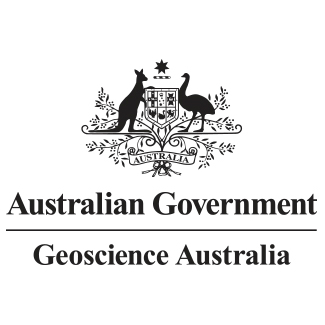Brief description
The Intertidal Extents Model (ITEM v1.0) product is a national scale gridded dataset characterising the spatial extents of the exposed intertidal zone, at intervals of the observed tidal range. The current version utilises all Landsat observations (5, 7, and 8) for Australian coastal regions (excluding off-shore Territories) between 1987 and 2015 (inclusive).
The Intertidal Extents Model (ITEM v1.0) consists of three datasets derived from the Landsat NBAR data managed in the Australian Geoscience Data Cube (AGDC) for the period 1987 to 2015.
The Coastal Cells shapefile (ITEM_CoastalCells.shp) identifies the location and extents of the 221 one degree by one degree AGDC cells used in the product, covering the mainland and Tasmanian coastline of the continent (Figure 1). The shapefile also includes information on the lowest (LOT) and highest (HOT) observed tides for the cell, and hence the observed tidal range (HOT-LOT), based on tidal modelling for the time of acquisition of each of the corresponding Landsat tile observations in the cell.
Attributes:
AGDC Cell Identifier
Lowest Observed Tide (LOT) - The lowest modelled tidal offset based on the acquisition times of all observations in the cell. Relative to Mean Sea Level (MSL) (m) x 1000.
Highest Observed Tide (HOT) - The highest modelled tidal offset based on the acquisition times of all observations in the cell. Relative to Mean Sea Level (MSL) (m) x 1000.
Lineage
Maintenance and Update Frequency: asNeededNotes
PurposeThe purpose of the ITEM v1.0 product is to assist in understanding the extent and elevation profile of the Australian intertidal zone. Examples of where this knowledge can contribute include environmental monitoring applications for migratory bird species, habitat mapping in coastal regions, hydrodynamic modelling, and geomorphology studies of features in the intertidal zone. Through attribution of the LOT and HOT values modelled for each cell, the extents model can be used to derive an elevation profile of the observed intertidal zone extent on a cell by cell basis. The method employed can be tailored based on user requirements. For example, by dividing the observed tidal range for a cell (HOT-LOT) into 10% interval values, contours can be assigned to the section of the Intertidal Extents Model contained in that cell. These can then be used as a standalone elevation data source, or interpolated to create a continuous intertidal digital elevation model for the cell. The ability to create an elevation model relative to MSL enables the data to be integrated as a complimentary data source, linking shallow water bathymetry and terrestrial elevation models.
Created: 02 06 2016
Issued: 14 06 2016
Data time period: 2008 to 30 11 2015
text: westlimit=112; southlimit=-44; eastlimit=154; northlimit=-10
User Contributed Tags
Login to tag this record with meaningful keywords to make it easier to discover
Download the data (shp)
uri :
https://d28rz98at9flks.cloudfront.net/100481/100481_Shapefile.zip![]()
Intertidal Extents Model Collection
uri :
https://pid.geoscience.gov.au/dataset/ga/100600![]()
Intertidal Extents Model Confidence Layer
uri :
https://pid.geoscience.gov.au/dataset/ga/100464![]()
Intertidal Extents Model Relative Extents Model
uri :
https://pid.geoscience.gov.au/dataset/ga/100482![]()
Product Description (pdf)
uri :
https://d28rz98at9flks.cloudfront.net/100481/Product_Description_Intertidal_Extents_Model.pdf![]()
- DOI : 10.4225/25/575F64E5BA264

- URI : pid.geoscience.gov.au/dataset/ga/100481

- global : 0457dc12-13c2-40be-9d30-1951ce48e105


